Worlds Aren’t Created for Nothing: Sci-fi, fantasy and magical reality
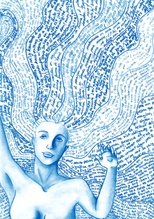 Ukrainian literature has ancient traditions, and fairy-tales and legends make the most delicious part of these. Stories of fabulous events and fantastic creatures have been in abundance here since the era of tales told by our ancestors near the fireplace. All things strange, mysterious, fantastic and incredible naturally thrive in this land, so it’s no wonder so many interesting authors were born here.
Ukrainian literature has ancient traditions, and fairy-tales and legends make the most delicious part of these. Stories of fabulous events and fantastic creatures have been in abundance here since the era of tales told by our ancestors near the fireplace. All things strange, mysterious, fantastic and incredible naturally thrive in this land, so it’s no wonder so many interesting authors were born here.
Authors who write high-quality fantasy books — generally based on folk legends and beliefs, capable of surprising and exciting the reader.
Thus, the plot of Maria Rymar’sBilyi Slon (White Elephant) is set in present-day Ukraine, and modern boys have to face ancient beings that still dwell in the Carpathian Mountains. As one would expect, such an encounter makes a life-changing experience — though to no less extent impressive is the land of great Carpathia itself, where life is so different from the rat-race of our daily urban existence. Reading the book is like having a brief vacation amidst the highlands’ wildlife with its crystal-clear lakes and mythical poludenytsyas, poterchas and forest spirits.
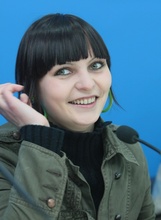 The heroine of Tetjana Vynokurova-Sadychenko’sZhart druhyi. Kvit paporoti (Joke Number Two. Fern-Blossom) sets forth to find the mystic blossom of fern, just as ancient Ukrainians did, in hope of solving her quite mundane problems. The author’s magical and bizarre world grows straight from the middle of modern routine. Werewolves, spirits, witches, bogies, the Fool and Death feel as at home here as do normal humans and the book’s principal character — a young journalist named Tetyana. However, Tetyana’s old, chatty, anything but tame forest cat Elvis makes the most exhilarating character in the novel. Elvis is a fan of realities on TV and tabloid reading teetotaler fond of creamed coffee, witch-herbed tea and folk songs. He’s been with Tetyana through thick and thin, advising, protecting and rescuing her. It is Elvis who helps her to get rid of various eerie creatures and pushy «God’s publicity agents», and finally gain the mythical fern-blossom (though the talking cat would also scare the wits out of Tetyana’s potential boyfriends).
The heroine of Tetjana Vynokurova-Sadychenko’sZhart druhyi. Kvit paporoti (Joke Number Two. Fern-Blossom) sets forth to find the mystic blossom of fern, just as ancient Ukrainians did, in hope of solving her quite mundane problems. The author’s magical and bizarre world grows straight from the middle of modern routine. Werewolves, spirits, witches, bogies, the Fool and Death feel as at home here as do normal humans and the book’s principal character — a young journalist named Tetyana. However, Tetyana’s old, chatty, anything but tame forest cat Elvis makes the most exhilarating character in the novel. Elvis is a fan of realities on TV and tabloid reading teetotaler fond of creamed coffee, witch-herbed tea and folk songs. He’s been with Tetyana through thick and thin, advising, protecting and rescuing her. It is Elvis who helps her to get rid of various eerie creatures and pushy «God’s publicity agents», and finally gain the mythical fern-blossom (though the talking cat would also scare the wits out of Tetyana’s potential boyfriends).
Readers love Tetjana’s trademark slight absurdism, well-known since when her debut Zhart. Iz zhytya psyhiv (A Joke. From the Life of Loonies)appeared. The book, featuring gremlins, a kitten changing into Sphinx, an Angel and a redhead interested in the relativity theory, is a story of a nut-house, love and search for the meaning of life hidden behind broken mirrors.
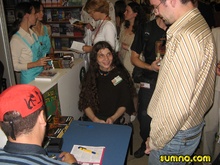 A world to which Olena Zakharchenko’sVyshyvani harbuzy (Embroidered Pumpkins)takes you is a female world where witches, mermaiden rusalkas, ghost maras dwell under the rules of those old Ukrainian legends. The heroine has to come through this world and a couple of other ones, searching for answers to her questions. The next Olena’s book, Brother-and-sister, is also based on ancient beliefs. The story (the title is the Ukrainian name of blue cow wheat) deals with troublesome themes of forbidden love between siblings.
A world to which Olena Zakharchenko’sVyshyvani harbuzy (Embroidered Pumpkins)takes you is a female world where witches, mermaiden rusalkas, ghost maras dwell under the rules of those old Ukrainian legends. The heroine has to come through this world and a couple of other ones, searching for answers to her questions. The next Olena’s book, Brother-and-sister, is also based on ancient beliefs. The story (the title is the Ukrainian name of blue cow wheat) deals with troublesome themes of forbidden love between siblings.
Kostyantyn Matvienko’s Chas nastav (The Time Has Come) is set in ancient Kyiv. The protagonist travels in time from the present day into the first years after Christ. He meets Saint Andrew, makes friends with a bogie, and digs for antiquities in Kyiv-Pecherska Lavra monastery — instead coming across a time portal. The story, quite dynamic, features love, complicated schemes and nosy secret organizations. Adventures abound.
Books as such make mythical creatures look like an integral part of our reality. Even if our ancestors were simply seeing things after a nice quaffing, the stuff emerged from the imagination has been roaming this land for such long time that now it belongs here inseparably. Ukrainian authors generally anything but lack sense of humour — so their stories in no way resemble academic studies of folklore, rather being akin to tales told over a glass of horilka — sometimes really creepy, and sometimes rather juicy.
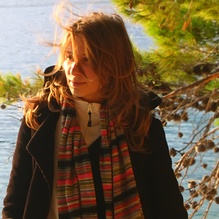 Nevertheless, Ukrainian fantasy authors will also eagerly create worlds of their own. Maryna Sokolyan’s Novendialiyi gives a picture of ancient Eastern-European town Drakuv with its own history, secrets and day-to-day routine, that of tourists and musical festivals. However, magic police also makes a part of this town’s routine. As well as does daily struggle for human souls and unceasing hunt after those who have lost their souls (as such people are a danger for society) and those who use drugs to steal this most precious substance. Apart from inserting a decent part of adventures into her stories, Maryna also deals with complicated relationships between people and puzzles her reader with some very unusual philosophy of her own. One more peculiarity of Sokolyan’s fiction is «parallel text», accompanying the main one. In Novendialiyi stories from Drakuv’s history told by a witty guide follows the main plotline, and in Kovdra snovydy (Sleepwalker’s Blanket) the author inserts «abstract from monograph entitled Consolidation of Mundanity» into the narrative. Kovdra snovydy’s fable spins around a tricky question: what may happen to gods whom people do not worship anymore? The story in fact resembles a magic blanket, knit of bright flickering sparkles. Yet another Sokolyan’s work, Cherem, retells the story of Messiah from a totally unexpected point of view. The author, however, does not insist that her text deals with the biblical tale — but a number of details makes the hint quite obvious. Maryna Sokolyan’s fiction is multilayered. Besides the books already mentioned, there is also a mystery social drama Kodlo (The Mob) and a mystery detective Chuzhi u domi (Strangers in the House) — where loves mingles with Cabbala. Balada dlya Kryvoyi Varhy (Ballad for Lame Varha) is also based on Ukrainian myths.
Nevertheless, Ukrainian fantasy authors will also eagerly create worlds of their own. Maryna Sokolyan’s Novendialiyi gives a picture of ancient Eastern-European town Drakuv with its own history, secrets and day-to-day routine, that of tourists and musical festivals. However, magic police also makes a part of this town’s routine. As well as does daily struggle for human souls and unceasing hunt after those who have lost their souls (as such people are a danger for society) and those who use drugs to steal this most precious substance. Apart from inserting a decent part of adventures into her stories, Maryna also deals with complicated relationships between people and puzzles her reader with some very unusual philosophy of her own. One more peculiarity of Sokolyan’s fiction is «parallel text», accompanying the main one. In Novendialiyi stories from Drakuv’s history told by a witty guide follows the main plotline, and in Kovdra snovydy (Sleepwalker’s Blanket) the author inserts «abstract from monograph entitled Consolidation of Mundanity» into the narrative. Kovdra snovydy’s fable spins around a tricky question: what may happen to gods whom people do not worship anymore? The story in fact resembles a magic blanket, knit of bright flickering sparkles. Yet another Sokolyan’s work, Cherem, retells the story of Messiah from a totally unexpected point of view. The author, however, does not insist that her text deals with the biblical tale — but a number of details makes the hint quite obvious. Maryna Sokolyan’s fiction is multilayered. Besides the books already mentioned, there is also a mystery social drama Kodlo (The Mob) and a mystery detective Chuzhi u domi (Strangers in the House) — where loves mingles with Cabbala. Balada dlya Kryvoyi Varhy (Ballad for Lame Varha) is also based on Ukrainian myths.
Though the world of Taras Zavitaylo’s Tsilkom mozhlyve fentezy (Rather Possible Fantasy) is called Chaos, its rules, however weird, are also quite strict. Into this place human souls slide and are turned into Fevers, Glitches, Succubae and other stuff human imagination has created. These monsters, nevertheless, are completely lawful, and their visits to the Earth follow a severe schedule, their mission being to frighten people. Among other cases, Chaos takes souls of those in coma and lethargic sleep. Two principal characters, the Lethargist and the Comatose, have to untangle the cobwebs of Chaos in order to return into their bodies and the world of living. The author’s wild imagination is inferior only to his sense of humour, so you will not be bored in the most refined (though not exactly lively) company of the two.
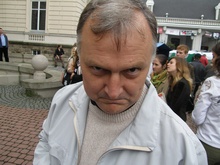 Another writer proficient in the use of his imagination is Serhiy Baturyn. His Mech koroliv (Sword of Kings) tells the legend of the race of prahngs, said to descend from the sky. There is love, divorce, war, mysterious ships emerging from the sea — the clash between prahngs and the hostile neighbour kingdom being the most exciting part. The logic of events is absolutely true-to-life, fantastic backdrop and real-world problems making a perfect match.
Another writer proficient in the use of his imagination is Serhiy Baturyn. His Mech koroliv (Sword of Kings) tells the legend of the race of prahngs, said to descend from the sky. There is love, divorce, war, mysterious ships emerging from the sea — the clash between prahngs and the hostile neighbour kingdom being the most exciting part. The logic of events is absolutely true-to-life, fantastic backdrop and real-world problems making a perfect match.
Such fiction, elegantly combining reality and fancy, and thus opening and revising the wrongs of our daily existence, is written by Marina and Sergey Dyachenko, Henry Lion Oldie, Andrey Valentinov, Vladimir Arenev, and Yana Dubinyanskaya. These authors, born and living in Ukraine, write in Russian, successfully competing with the «genuinely» Russian authors, winning awards, their books printed and reprinted. Best-selling Russian authors being in fact Ukrainians, the situation seems quite fantastic!
These writers address the perennial matters of choice and responsibility, of one’s ability or disability to rule their own destiny, of power and its impact on human psyche, of «life, the Universe and everything’, as Douglas Adams once put it.
Tymur Lytovchenko is also interested in such things, though the tools in his universe-construction kit are those of science fiction. The future, interstellar journeys and high technologies in his Pryrecheniy zhyty (Doomed to Life) look entirely convincing. He also masterfully engineers the morals and religion of the future society, though the deity of our possible descendants is but another perfect machine. Such is the backdrop of the story — the main part belonging, once again, to the human being, their doom of choice, their right of sacrifice and, quite naturally, their ability to feel. Lytovchenko follows the path of great Stanislav Lem, Clifford Simak, and Strugatsky brothers, whose characters also battle with adversity in the depths of space.
Another author interested in the future of the Earth, the further development of technology and its possible effects is Oleksandr Levchenko. His short-stories are imaginative and witty, featuring machines of time, interplanetary flights and teleportation. In Vich-ma-vich z samym soboyu (Face to Face with Own Self) the character is split in two because of a «traditional» teleport glitch, and has to handle living in two bodies at once. The hero of Porazka (Defeat) comes back to his native planet and faces a trouble quite possible in the distant future, his people divided into warring factions: one striving to return into the fold of the mother civilization, another struggling for independence. Such collisions are indeed not purely stuff of fiction, their keeping in touch with reality making the reader feel more sympathy for the character.
Let us now change blasters for swords and abandon spaceships for horses — it is not the future that we face, but the past, where glorious victories, brave warriors, ardent love and fantastic plots feel at home.
The past with its real wars and historical characters is the source of imagination for those working in the genre of alternative history. Vasyl’ Kozheljanko (sadly, late in August 2008) was a true genius of the genre, often called the father of contemporary Ukrainian alternative history, or «political fantasy». Though «fantasy» here is rather a misleading term, as the world of Kozheljanko’s fiction is the real one. Historical events are generally the same, but certain key aspects differ, the writer playing the eternal game of «what if» with his readers. And some «ifs» produce an astonishing result!
Kozheljanko published seven books belonging to the genre, and the most influential are Defiliada v Moskvi (Military Parade in Moscow), Konotop and Terrorium. The Ukraine of these novels has a different history, sometimes more fascinating than the real one. Audacious plots and the author’s mastery of the real history make the reading a compulsive thing. The «great November revolution» in Terrorium (2001) almost wholly anticipated the Orange Revolution (2004), Kozheljanko’s book being practically the script of the latter’s events. The names of «alternative» political elite in the novel are exceptionally well-chosen. Characters like general-colonel Kurvenko (Sonovabitch), general-lieutenant Laynov (Crapper) and minister of finance Nischikh (Deadbeat) are scandalous enough, not to mention Kozheljanko’s humour, sharp to the point of cruelty. The book was a bombshell in its time, and nowadays one still can turn back to it for better understanding of current political developments.
Defiliada v Moskvi’s themes of Ukraine’s victory in WWII are in fact not that fresh, as a number of authors have already elaborated upon them, but the Battle of Konotop revised in Konotop is unique.
Ukraine as a superpower in Kotyhoroshko can make one roar with laughter, while the intricate plot of Lzenostradamus (False Nostradamus), however saturated with Kozheljanko’s ever-present irony, requires attentive reading. The efforts will definitely not be lost upon you, as the book reveals the mechanisms that drive the history.
Kozheljanko also wrote three retro-historical, or historical reconstruction novels: Sribniy pavuk (Silver Spider), Tretye pole (The Third Field) and Efiopska sich (The Ethiopian Sich). Sribniy pavuk has already been translated and published in Finland.
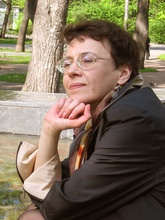 Equally absorbing are books dealing with the history and social evolution as such, without focusing on this or that period. Oksana Zabuzhko’s Knyha buttya. Hlava chetverta (Book of Genesis. Chapter Four) is a combination of philosophical parable and dystopia. The book, though written years earlier, has been published only recently so some of the prophecies did in it have already come true. In the foreword to the book Zabuzhko states that she wouldn’t live to see such Civilization; but the parallels with today are too numerous.
Equally absorbing are books dealing with the history and social evolution as such, without focusing on this or that period. Oksana Zabuzhko’s Knyha buttya. Hlava chetverta (Book of Genesis. Chapter Four) is a combination of philosophical parable and dystopia. The book, though written years earlier, has been published only recently so some of the prophecies did in it have already come true. In the foreword to the book Zabuzhko states that she wouldn’t live to see such Civilization; but the parallels with today are too numerous.
Oleksandr Irvanets’ Rivne/Rovno is also a dystopia, the genre becoming rather too prophetic when picked up by a talented author. The novel is about a city divided by an insurmountable wall. Ukraine divided in two could easily become our reality in 2004. Irvanets paints an uneasily realistic picture of a split country with destinies, childhood reminiscences and families torn asunder. Psychological depth combined with the fast pace of events grabs and holds reader’s attention till the last page. Another book by Irvanets Ochamymrya deals with a possible Ukraine’s future, though the plot is fictitious, with a giant wyrm, first an imaginary creature, entering the reality and attacking the City (obviously Kyiv). Grotesque Knyez and the other «fathers of the city» would make the reader laugh, as the political «elite» is way too recognizable, unchanged since the book was written and unlikely to change in the future, however mythical.
«Remixing» the history too, Dmytro Bilyi writes in a different vein. In his novel Basavryuk XX unearthly creatures act on the backdrop of the 1918-21 Civil War. The author focuses rather on things mysterious than on the actual tragedy of the war-tormented country, characters searching for the Temple of Horror, the discovery of which is supposed to prevent further tragedies — those of years 1932-1933 and 1938-1939 — from becoming reality. But as one of the characters, the Black Army anarchist states, «a nation cannot be saved unless it saves itself». The book, set in an age historically appalling enough, is teeming with witches, vampires and werewolves, the author taking after great master of horror Nikolay Gogol. Parts like that of the hero’s best friend turning into a rotting vampire make one’s hair stand on end, but one just can’t help continuing the reading. Bewitching horror seems to be a trademark of Ukrainian mystical fiction.
 The Kapranov brothers in Kobzar-2000 and Kobzar-2000: New Chapters (both are collections of short stories) use the same tried and true recipe, but temporal gap between the era where the actual stories take place and the era when the «source book» was written is wider. The name Kobzar clearly alludes to Taras Shevchenko’s Kobzar, as names of all the stories in both Kapranovs’ books are those of poems by this great Ukrainian bard. Revised and set in today, these tales retain their mystical charm. Perebendya (The Banterer), Katerynka, Vovkulaka (The Werewolf), Dolya (The Fate) and Neophit are all stories from life, the authors bringing mysticism into daily lives of a doctor and a Canadian tourist, a woman from a small village and a sailor. The names are familiar, the contents are unexpected and novel, the magic is old, and the plots keep one reading and reading till the very end of the book. And even after the last page have been turned, one feels an urge to open the book again, just like a child looking into an empty box of chocolates — are there really nothing more to eat? The sweets by the Kapranov brothers are a savoury mix of day-to-day existence (though the characters are a bit more appealing and intelligent than you would expect in real life, and fiercely sensual) and esoteric themes. Having tasted it once, you can’t wait to enjoy another portion. Let’s just hope that a new book by the Kapranov brothers, made after the same original recipe, is to be printed soon.
The Kapranov brothers in Kobzar-2000 and Kobzar-2000: New Chapters (both are collections of short stories) use the same tried and true recipe, but temporal gap between the era where the actual stories take place and the era when the «source book» was written is wider. The name Kobzar clearly alludes to Taras Shevchenko’s Kobzar, as names of all the stories in both Kapranovs’ books are those of poems by this great Ukrainian bard. Revised and set in today, these tales retain their mystical charm. Perebendya (The Banterer), Katerynka, Vovkulaka (The Werewolf), Dolya (The Fate) and Neophit are all stories from life, the authors bringing mysticism into daily lives of a doctor and a Canadian tourist, a woman from a small village and a sailor. The names are familiar, the contents are unexpected and novel, the magic is old, and the plots keep one reading and reading till the very end of the book. And even after the last page have been turned, one feels an urge to open the book again, just like a child looking into an empty box of chocolates — are there really nothing more to eat? The sweets by the Kapranov brothers are a savoury mix of day-to-day existence (though the characters are a bit more appealing and intelligent than you would expect in real life, and fiercely sensual) and esoteric themes. Having tasted it once, you can’t wait to enjoy another portion. Let’s just hope that a new book by the Kapranov brothers, made after the same original recipe, is to be printed soon.
 But the queen of Ukrainian mystical historical prose is undoubtedly Halyna Pahutyak. In her writing different epochs (from XII to XX century), Ukrainian «domestic demonology» and imagination unrestrained are beautifully interlaced. The author claims she’s related to Dracula himself, and the mere names of her books can thrill you: Pahn u chornomu kostyumi z blyskuchymy gudzylamy (A Gentleman in Black Suit with Shining Buttons), Urizka hotyka (Gothic of Urizh), Sluha z Domromylya (The Servant from Dobromyl), Pysar Skhidnyh Vorit Prytulku (The Clerk of Shelter’s East Gates) and Pysar Zakhidhyh Vorit Prytulku (The Clerk of Shelter’s West Gates). Halyna carefully and skillfully choreographs her plots, and no character, no line is left unresolved. In all her works there is the ever-present theme of another world, of crossing this reality’s boundaries and entering a place where time flows differently, folk rites, beliefs and superstitions are at work, and all is full of symbolism.
But the queen of Ukrainian mystical historical prose is undoubtedly Halyna Pahutyak. In her writing different epochs (from XII to XX century), Ukrainian «domestic demonology» and imagination unrestrained are beautifully interlaced. The author claims she’s related to Dracula himself, and the mere names of her books can thrill you: Pahn u chornomu kostyumi z blyskuchymy gudzylamy (A Gentleman in Black Suit with Shining Buttons), Urizka hotyka (Gothic of Urizh), Sluha z Domromylya (The Servant from Dobromyl), Pysar Skhidnyh Vorit Prytulku (The Clerk of Shelter’s East Gates) and Pysar Zakhidhyh Vorit Prytulku (The Clerk of Shelter’s West Gates). Halyna carefully and skillfully choreographs her plots, and no character, no line is left unresolved. In all her works there is the ever-present theme of another world, of crossing this reality’s boundaries and entering a place where time flows differently, folk rites, beliefs and superstitions are at work, and all is full of symbolism.
 Sluha z Domromylya is based on Ukrainian folk legends about vampires and their magic power. The novel is set in the town of Dobromyl, soon after the WWII is over. A strange patient arrives to the Dobromyl mental hospital, situated in an ancient cloister. The stranger enthralls the hospital’s tired, responsibility-burdened, ill chief doctor, and magically puts the patients and personnel to sleep. He does so to save a wounded young rebel, his wife and his son, who are hiding in the hospital. The doctor operates the rebel; the stranger appears to be the mythical Servant from Dobromyl, well-known among the locals. He tells the story of his life to the doctor: descended from a witch and an undead vampire, he is a dhampir, a creature possessing strange and magical powers. For 800 years he serves and protects the Dobromyl land and its people.
Sluha z Domromylya is based on Ukrainian folk legends about vampires and their magic power. The novel is set in the town of Dobromyl, soon after the WWII is over. A strange patient arrives to the Dobromyl mental hospital, situated in an ancient cloister. The stranger enthralls the hospital’s tired, responsibility-burdened, ill chief doctor, and magically puts the patients and personnel to sleep. He does so to save a wounded young rebel, his wife and his son, who are hiding in the hospital. The doctor operates the rebel; the stranger appears to be the mythical Servant from Dobromyl, well-known among the locals. He tells the story of his life to the doctor: descended from a witch and an undead vampire, he is a dhampir, a creature possessing strange and magical powers. For 800 years he serves and protects the Dobromyl land and its people.
The action in both Pysar Skhidnyh Vorit Prytulku and Pysar Zakhidhyh Vorit Prytulku take place a special place named the Shelter. No map charts it, yet all who really yearn to get here find it easily. There’s no today, yesterday or tomorrow here, and the Shelter itself is both a building and a country, and at the same time it is no more than a road between the East Gates, through which newcomers enter the Shelter, and the West Gates, trough which they go back to the real world. The journey hurts both physically and spiritually, and no person comes here for happiness — for the Shelter cannot give but oblivion.
Another brilliant mystical novel is Vasyl’ Slapchuk’s Slipiy dosch (The Sunshower). The story in three parts is told from the first person, one of the characters being a werewolf — which definitely adds suspense and thrill. The unfortunate man changes shape, craves for hunt and the taste of hot blood on his fangs, then becomes a human again — and the author’s talent in storytelling makes his suffering feel disturbingly familiar. The novel also gives piercing freshness to a traditional Ukrainian theme of a girl disgraced, bearing a child and being exiled from the aggressive patriarchal community. The tale of fabulous search for destiny with all the mystical happenings and rites looks completely real when told by an author like Slapchuk.
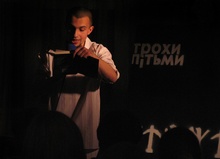 Ljubko Deresh’s Kult (The Cult) anything but lacks mysticism. The plot is much more intricate, but solving rebuses has always been appealing, especially when the answer is not an easy one. The principal hero’s trans-personal trips through his inner fantasy worlds are intertwined with a story of young teacher’s love to one of his students. The author claims that love — and this particular love — can save the world (and the novel deals with a possible end of the world!). It’s difficult to decide why exactly the novel has been so successful, but it definitely has become iconic for the younger readers. Such popularity may be partially explained by the fact that Deresh wrote this novel when he was only 16 years old, thus closely familiar with his teenage fans’ tastes.
Ljubko Deresh’s Kult (The Cult) anything but lacks mysticism. The plot is much more intricate, but solving rebuses has always been appealing, especially when the answer is not an easy one. The principal hero’s trans-personal trips through his inner fantasy worlds are intertwined with a story of young teacher’s love to one of his students. The author claims that love — and this particular love — can save the world (and the novel deals with a possible end of the world!). It’s difficult to decide why exactly the novel has been so successful, but it definitely has become iconic for the younger readers. Such popularity may be partially explained by the fact that Deresh wrote this novel when he was only 16 years old, thus closely familiar with his teenage fans’ tastes.
Another «hope of contemporary fiction» is Maria Rjapolova (born 1987), who in 2008 won the Star Fortress literary contest, and has published a lot of short stories in different magazines. In 2009 her debut novel Buretsvit (The Stormflower) is to come out in print. The author’s easy style and imaginative, fresh designs for stories will certainly make her popular among sci-fi and fantasy fans.
Ukrainian sci-fi, fantasy, mystical and horror fiction is growing more and more popular thanks to the Web and literary magazines, with publishing houses starting new series of books. No wonder, as people have always been craving for being surprised, amazed and enthralled by the unknown. The desire to lose oneself in a world so different from this one knows no age, professional or educational boundaries.
This kind of literature lovers can be male or female, teenage or senior, professors or loaders, bankers or assassins, deputes or thieves, clerks or street-walkers… So, going book-hunting, do not go past the books I’ve mentioned to you above!

